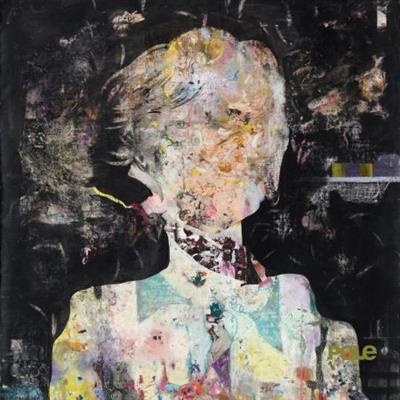Pole - Tempus (2022) [Official Digital Download 24/96]
FLAC (tracks) 24-bit/96 kHz | Front Cover | Time - 44:47 minutes | 899 MB
Electronic, Dub Techno, IDM, Ambient | Label: Mute Records, Official Digital Download
TracklistPole returns with another busted, bass-heavy woozer after 2020's unexpected "Fading". His most jazz-inspired record to date, it's stripped to the bare bones, assembled with brushy acoustic drum sounds, broken synthesizers and gut-wrenching subs.
When Pole emerged after a five year absence with "Fading", he sounded creatively refreshed. Informed by the perception of his mother's dementia and the concept of memory, he attempted to replicate musically and succeeded in revitalising his idiosyncratic burned dub signature. "Tempus" picks up where its predecessor left off, not necessarily hinging itself on the idea of memory, but of time, attempting to fold the past, present and future into itself. For an album that appears to suggest byzantine complexity, the end result is almost chillingly unadorned. Stefan Betke has pulled back his already slight sonics to an impressive whisper of bass, percussion and occasional embellishment - the itchy, distorted interference that wrapped his cult debut trilogy in torn netting is all but gone, leaving behind an icy silence that feels futuristic.
'Tempus' is a smart, considered album that works conceptually because Betke is able to reference his past without aping or repeating himself. The early album tracks are more cautious in their approach, helping to reconcile the past and present: opener 'Cenote' for example submerges Betke's sizzling white noise percussion almost completely, hinting at the album's jazz influences without being too forceful. 'Alp' is far more direct; Betke's bass is separated from its '70s dub template and oozed into bizarre jazz/exotica zones alongside clipped electric piano fades and freeform, hollow drum hits. On 'Stechmück' we get the full reveal, as Betke integrates the logic of his genesis, using a malfunctioning Minimoog instead of his namesake fritzed Waldorf 4-Pole filter. The dying, detuned synth tones speak directly to Betke's past, underpinning his fine-ground dub backdrop.
'Firmament' isthe album's most unexpected track, using short piano stings alongside analog synth womps and loose rhythms to evoke the emotional architecture of jazz. It's moody, blunted material that sounds almost like a contortion of Bohren & der Club of Gore's doomed Badalamenti-inspired smoke; Betke is less descriptive with his sounds, but the mood is unmistakable. Lengthy closing track 'Allermannsharnisch' is just as cinematic, touching a noir-ish lounge swagger with mind-altering low-end animation and unsettling psychedelic effects.
Next level material - if you've been ignoring Pole since the early days, now's the time to take another look.
01. Cenote
02. Grauer Sand
03. Alp
04. Stechmück
05. Firmament
06. Tempus
07. Allermannsharnisch
Download link
rapidgator.net:
uploadgig.com:Kod:https://rapidgator.net/file/fbc4e47535575f33e57e6347b2a9c09b/sjkil.Pole..Tempus.2022.Official.Digital.Download.2496.rar.html
nitroflare.com:Kod:https://uploadgig.com/file/download/5B0b302dB8E319d9/sjkil.Pole..Tempus.2022.Official.Digital.Download.2496.rar
1dl.net:Kod:https://nitroflare.com/view/892B42632209817/sjkil.Pole..Tempus.2022.Official.Digital.Download.2496.rar
Kod:https://1dl.net/dcshmv8j4ts6/sjkil.Pole..Tempus.2022.Official.Digital.Download.2496.rar
2 sonuçtan 1 ile 2 arası
-
10.05.2023 #1Üye



- Üyelik tarihi
- 20.08.2016
- Mesajlar
- 144.947
- Konular
- 0
- Bölümü
- Bilgisayar
- Cinsiyet
- Kadın
- Tecrübe Puanı
- 153
Pole - Tempus (2022) [Official Digital Download 24/96]
-
11.05.2023 #2Üye



- Üyelik tarihi
- 22.02.2022
- Yaş
- 41
- Mesajlar
- 24.422
- Konular
- 0
- Bölümü
- Metalurji ve malzeme
- Cinsiyet
- Kadın
- Tecrübe Puanı
- 27
Cevap: Pole - Tempus (2022) [Official Digital Download 24/96]
[Misafirler Kayıt Olmadan Link Göremezler Lütfen Kayıt İçin Tıklayın ! ] nó rất có Ã*ch vá»i mình, thanks bạn nhiá»u nhé
Liên hỠ7002106091
Konu Bilgileri
Users Browsing this Thread
Şu an 1 kullanıcı var. (0 üye ve 1 konuk)



 LinkBack URL
LinkBack URL About LinkBacks
About LinkBacks





 Alıntı
Alıntı
Konuyu Favori Sayfanıza Ekleyin